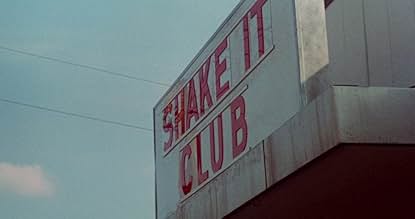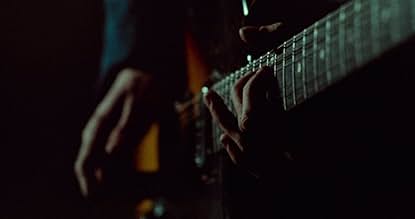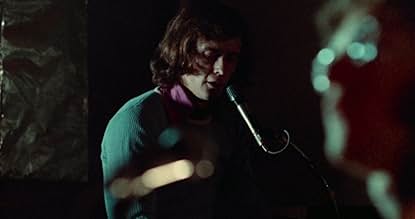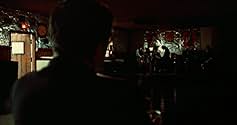AVALIAÇÃO DA IMDb
6,1/10
490
SUA AVALIAÇÃO
Adicionar um enredo no seu idiomaComfortable New York suburbanites Arthur and Gerrie Mason learn that their seemingly innocent teenage daughter Maxie is a drug addict.Comfortable New York suburbanites Arthur and Gerrie Mason learn that their seemingly innocent teenage daughter Maxie is a drug addict.Comfortable New York suburbanites Arthur and Gerrie Mason learn that their seemingly innocent teenage daughter Maxie is a drug addict.
Anthony D. Call
- Dr. Lauren
- (as Anthony Call)
Janet Sarno
- Night Nurse
- (as Jan Sarno)
Avaliações em destaque
(1970) The People Next Door
PSYCHOLOGICAL DRAMA
It has parents, Arthur Mason (Eli Wallach) and Gerrie Mason (Julie Harris) have two children with promising music careers- one as a pianist; their daughter, Maxie Mason (Deborah Winters) and their rock and roll son, Artie Mason (Stephen McHattie). Problems start as soon as their daughter, Maxie begins to try acid and she not only gets herself hooked but also craves to try other drugs such as LSD.
Upon looking at the rating of one of my favorite movie critics, Roger Ebert, I was quite surprised he gave this movie a positive rating to the tune of 3 and a half stars out of 4 when I thought when I watched it, it felt it was out of touch and outdated. Upon glancing Ebert's review, he kept mentioning the documentary "Woodstock", as if the two movies are somehow linked- they are not. Perhaps during the era but these days there are better movies made about the subject matter than their were back then. It is also more unlikely that a daughter pianist would get into drugs than someone who is into rock and roll who happens to be the family's son. It also does not address other drugs that can be helpful such as marijuana and mushrooms to which tests have been revealed they can be helpful, but are often abused.
It has parents, Arthur Mason (Eli Wallach) and Gerrie Mason (Julie Harris) have two children with promising music careers- one as a pianist; their daughter, Maxie Mason (Deborah Winters) and their rock and roll son, Artie Mason (Stephen McHattie). Problems start as soon as their daughter, Maxie begins to try acid and she not only gets herself hooked but also craves to try other drugs such as LSD.
Upon looking at the rating of one of my favorite movie critics, Roger Ebert, I was quite surprised he gave this movie a positive rating to the tune of 3 and a half stars out of 4 when I thought when I watched it, it felt it was out of touch and outdated. Upon glancing Ebert's review, he kept mentioning the documentary "Woodstock", as if the two movies are somehow linked- they are not. Perhaps during the era but these days there are better movies made about the subject matter than their were back then. It is also more unlikely that a daughter pianist would get into drugs than someone who is into rock and roll who happens to be the family's son. It also does not address other drugs that can be helpful such as marijuana and mushrooms to which tests have been revealed they can be helpful, but are often abused.
Theatrical remake of a well-regarded 1968 "CBS Playhouse" special for television about the secret drug-life of today's suburban teenagers was directed both times by David Greene, who practically disowned this franker, R-rated version. The problem could be in the central casting: Eli Wallach pushes far too hard as the clueless father of a tripping 16-year-old girl while mom Julie Harris smokes and looks distraught (when her daughter tells her she's on the Pill, Harris hilariously responds, "I think I'm losing my mind!"). The original rock songs (performed by The Bead Game and The Glass Bottle) are dreadfully pedagogic--hoping to 'inform' us with their lyrics--but, since nobody can reach this alienated girl, what good is it probing her inner-thoughts to music? Generation Gap tale has a solid cast (including Hal Holbrook, Cloris Leachman, Rue McClanahan, Stephen McHattie, Don Scardino, newcomer Deborah Winters, and Rutanya Alda as a pixilated nurse), yet the pitch of the film is off, hysterical instead of riveting. ** from ****
unfortunately, the only treasured memory I have of this film is the fully nude hairy biker descending the stairs...I saw the SNEAK PREVIEW Of this movie in 1970, when I was ten, accompanied by my parents and my mother's 84 year old childhood governess. I can say that it was electrifying to me at that age to see a middle-class home thrown into chaos by naked tripping hippies. The governess did not have any comment, but what she must have been thinking...I always wondered if the male nude scene was later cut for general release, and if so was I privileged enough to see the DIRECTOR'S CUT with my parents and the governess...this would still be a fairly shocking film if seen today. needs a DVD release.
This is one of those hysterical 70's anti-drug movies made by people who obviously had little or no experience with real-life drug abuse. If you have never seen on of these, I urge you to do so (preferably stoned).The drama begins when the seemingly innocent sixteen-year-old daughter (Deborah Winters) of a middle-class family is found whimpering in her closet and tripping her face off. The cantankerous father (Eli Wallach) quickly blames his long-haired musician older son (Stephen McHattie) and kicks him out of the house, while the mother (Julie Harris) recedes into a kind of a hysterical, walking coma. But like all virginal, middle-class girls in these movies, once she gets her first taste of drugs, the daughter is soon shacking up with a skeezy biker and putting every substance imaginable into her nubile, young body. Meanwhile, the father confides in his doctor friend next door(Hal Holbrook), who seems to have the perfect All-American family in wife ( ) and clean-cut son (Don Scardino), but there's a twist there which you'll doubt see coming from a mile away.
I expected this to strictly be a TV movie, but actually it started out as that in 1968 before being remade as this theatrical feature, complete with some mild sordidness, fairly graphic drug use, brief nudity, and actual cursing. Eli Wallach is great as the cantankerous, bigoted father who is almost certain to get some kind of comeuppance. Harris and McHattie are adequate, but don't have a lot to do as most of the scenery around them gets pre-shredded by their fellow thespians. The latter's band actually isn't bad, and that is probably the "hippest" aspect of this generally "square" movie. Hal Holbrook has an interesting role as he starts out playing his usual type (the kindly father figure),but ends up going very much against type. Obscure 70's TV actress Deborah Winters (who isn't remotely believable as sixteen year old) gives a wide-eyed, completely over-the-top performance that will probably provoke more laughter than anything else, but she is very cute and does have a nude scene (only brief, but she's all drugged-up and throwing herself at her own father at the time, so. . .).
The director of this, David Green, was British and made several interesting theatrical films in his home country like "I Start Counting", "The Strange Affair", and "The Shuttered Room". This was the beginning of his long descent into 70's American television (a similar fate befell other talented Brit directors like John Moxley, Gordon Hessler, and Robert Fuest). This isn't a spot on his earlier theatrical work, but it's much better than his later made-for-TV stuff like "Vacation in Hell". See this with your favorite controlled substance.
I expected this to strictly be a TV movie, but actually it started out as that in 1968 before being remade as this theatrical feature, complete with some mild sordidness, fairly graphic drug use, brief nudity, and actual cursing. Eli Wallach is great as the cantankerous, bigoted father who is almost certain to get some kind of comeuppance. Harris and McHattie are adequate, but don't have a lot to do as most of the scenery around them gets pre-shredded by their fellow thespians. The latter's band actually isn't bad, and that is probably the "hippest" aspect of this generally "square" movie. Hal Holbrook has an interesting role as he starts out playing his usual type (the kindly father figure),but ends up going very much against type. Obscure 70's TV actress Deborah Winters (who isn't remotely believable as sixteen year old) gives a wide-eyed, completely over-the-top performance that will probably provoke more laughter than anything else, but she is very cute and does have a nude scene (only brief, but she's all drugged-up and throwing herself at her own father at the time, so. . .).
The director of this, David Green, was British and made several interesting theatrical films in his home country like "I Start Counting", "The Strange Affair", and "The Shuttered Room". This was the beginning of his long descent into 70's American television (a similar fate befell other talented Brit directors like John Moxley, Gordon Hessler, and Robert Fuest). This isn't a spot on his earlier theatrical work, but it's much better than his later made-for-TV stuff like "Vacation in Hell". See this with your favorite controlled substance.
David Greene's obscure THE PEOPLE NEXT DOOR is out to prove that a parent, in particular a father working eight-hours and then having a nightcap and sleeping pill to fall asleep, is just the same as a wayward teenager dropping acid...
The latter happens quickly as underrated starlet Deborah Winters, after watching brother Stephen McHattie's hippie band rehearsing, winds up in her own closet, seeing God and thus, freaking out...
She later attempts spitefully french-kissing dad Eli Wallach, married to chain-smoking Julie Christie, both desperately trying to figure out what makes their drug-fueled, discontented daughter tick...
Ironically, Winters would wind up in another LSD-centered cult film, BLUE SUNSHINE, and she always gives an intense performance, visually epitomizing the cute blonde California girl who's miserably unglued, in this case adding much-needed suspense, like anything can happen at any time...
And while both her bad acid trip and idealistic tantrums literally peak too soon for an effectively cohesive melodrama of a clashing suburban clan to follow, NEXT DOOR is a semi-worthwhile compromise between an anti-drug exploitation and counter-culture propaganda for the young people themselves...
That is, despite the youth-rebel cliches... that Winters successfully rises above despite a somewhat mundane television-style script... which fits since she had co-starred in a 1968 CBS Playhouse (with a different surrounding cast) that this feature was adapted from...
So when she eventually takes a backseat to the primary story (while mom and dad deal with their own mundane demons), there's hardly any tale to tell since, after all, a bad trip beats a bummer trip.
The latter happens quickly as underrated starlet Deborah Winters, after watching brother Stephen McHattie's hippie band rehearsing, winds up in her own closet, seeing God and thus, freaking out...
She later attempts spitefully french-kissing dad Eli Wallach, married to chain-smoking Julie Christie, both desperately trying to figure out what makes their drug-fueled, discontented daughter tick...
Ironically, Winters would wind up in another LSD-centered cult film, BLUE SUNSHINE, and she always gives an intense performance, visually epitomizing the cute blonde California girl who's miserably unglued, in this case adding much-needed suspense, like anything can happen at any time...
And while both her bad acid trip and idealistic tantrums literally peak too soon for an effectively cohesive melodrama of a clashing suburban clan to follow, NEXT DOOR is a semi-worthwhile compromise between an anti-drug exploitation and counter-culture propaganda for the young people themselves...
That is, despite the youth-rebel cliches... that Winters successfully rises above despite a somewhat mundane television-style script... which fits since she had co-starred in a 1968 CBS Playhouse (with a different surrounding cast) that this feature was adapted from...
So when she eventually takes a backseat to the primary story (while mom and dad deal with their own mundane demons), there's hardly any tale to tell since, after all, a bad trip beats a bummer trip.
Você sabia?
- CuriosidadesDavid Greene thought that the final cut of the film was so distorted that he tried, without success, to have his name removed from the credits.
- Citações
Old couple's son: [to father] You are a shit! Why don't you just go away someplace and die? Just die!
- ConexõesFeatured in Classroom Scare Films Vol. 5: More Drug Evils (1997)
- Trilhas sonorasMama, Don't You Wait Up for Me
Written by Scott English (as Scott David English) and Larry Weiss
Sung by The Glass Bottle
Principais escolhas
Faça login para avaliar e ver a lista de recomendações personalizadas
- How long is The People Next Door?Fornecido pela Alexa
Detalhes
Bilheteria
- Faturamento bruto nos EUA e Canadá
- US$ 217.510
Contribua para esta página
Sugerir uma alteração ou adicionar conteúdo ausente

Principal brecha
By what name was A Culpa de Cada Um (1970) officially released in India in English?
Responda




























